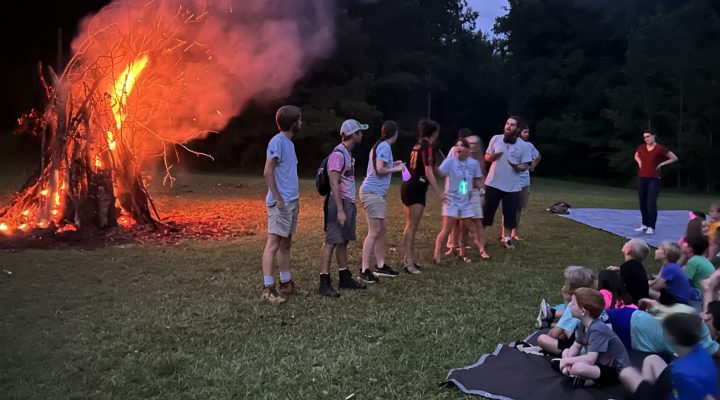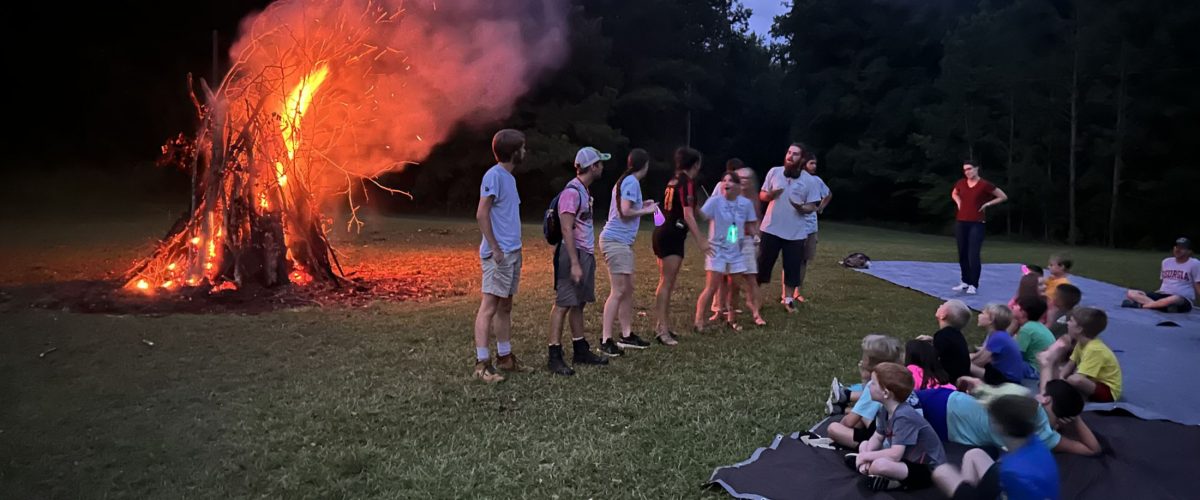Ten days after the Georgia Baptist Mission Board announced the closing of its discipleship-focused camp in Middle Georgia, an agreement appears to allow the facility to remain open under the Friends of Kaleo.
The Georgia Baptist Mission Board posted a brief document on the Camp Kaleo website Sept. 10 announcing the closure effective “on or before Dec. 15.” The document quoted Tim Oliver, chairman of the board’s Administration Committee, which serves as the state convention’s highest policy-making committee.
Barely a week later, on Sept. 20, The Christian Index, Georgia’s state paper, announced the two entities have entered into a memorandum of understanding that could allow the continued operation of the rustic camp. No details were offered regarding a purchase price or other ways the nonprofit would assume management as early as Jan. 1.

David Melber
But David Melber, GBMB chief operating officer, said “The prospect of Friends of Kaleo owning the future of Camp Kaleo is exciting.” Then he offered the caveat that, “although much has to happen for this to be completed, we are committed to due diligence with prayerful enthusiasm.”
The Georgia convention has been in a chronic state of downsizing since January 2019 under the administration of Thomas Hammond. A restructuring has reduced staffing by an estimated 75% and seen the sale of the Toccoa conference center in 2021 and the headquarters building earlier this year for a loss of nearly 50% — or $18.8-million — of its 2006 construction price.
Jim Strickland, president of Friends of Kaleo, said the group is “excited to be continuing the ministry of Camp Kaleo.”
A litany of reasons justified the closure, which was the result of a study begun last year to examine “the viability and effectiveness of the ministry.” The results then were ratified by the lower ranked Executive Committee in their regular session, a symbolic affirmation of the irreversible decision they had been handed.
The pending closure was blamed on the 37-year-old camp not generating enough funds to cover its expenses, which resulted in “significant maintenance and needed capital investments … being deferred,” according to the study report. The document then suggested delayed maintenance required $3 million to $5 million in “modernization repairs.”
One other finding indicated a steady decline in use by Georgia Baptist churches. But the report does not mention increased attendance — and a significant boost in income — from other groups who use the facility.
Identical charges were leveled against the Georgia Baptist Assembly at Toccoa when it was shuttered in January 2020.
Perhaps the most significant question is how a small fellowship of individuals just organized last year would be able to come up with the nearly $5 million needed for repairs. If, in fact, the amount is accurate.
Closure based on ‘facts and challenges that are hard to ignore’
In justifying the closure, Melber told Executive Committee members, “This was a very difficult decision, but it was based on facts and challenges that are hard to ignore.”

Mike Flowers
Not so fast, says a former camp director who spent just shy of two decades nurturing the ministry to solvency. Mike Flowers, a longtime camp director who brought the camp back from the brink of closure at the turn of the century, is contesting Melber’s statement and how he reached that conclusion.
Flowers served 19 years at the Forsyth property north of Macon. He is now publicly addressing the charges since, he says, the Mission Board came to their decision without a thorough investigation. An investigation, he maintains, that never consulted him from a historical perspective that was current until his 2021 departure.
Flowers believes that since the charges were made public — and reflected on his administration of the camp — his rebuttal should be made public.
A high-energy yet soft-spoken individual, Flowers is not drawn to strong differences of opinion by nature. But he feels the document falls short and lacks transparency in how it reaches its conclusion.
At the time of the agreement between the two parties, Flowers was crafting a four-page rebuttal to the Administration Committee via Oliver. He said he felt his character and management of the facility had been damaged by the allegations.
And he says he has the receipts to back it up.
It is no secret that Southern Baptist camps frequently operated in the red, much like other ministries like colleges and universities. Historically, these have been subsidized through gifts from churches to the denomination’s primary funding channel known as the Cooperative Program.
Kaleo was no different from any other Baptist camp and operated in the red from its first day of management through the state convention’s Men’s Ministries. Nearly 40 years ago, the Southern Baptist Convention and its affiliated state conventions were still flush with cash and state budgets frequently received income that exceeded their budgets.
Eventually the funding channel began to dry up as churches kept more for local ministry or a massive expansion of their properties, including relocating for more land and construction of their own recreational facilities. Those amenities included baseball fields, basketball gymnasiums and million-dollar family life centers including swimming pools justified as evangelistic outreach to their communities.

Camp Kaleo
Then conditions such as the 2008-2009 Great Recession, followed by other economic downturns, resulted in state conventions cutting budgets. Educational institutions, once sacred cows in Baptist life, were likewise pressured to hold down costs and increase enrollment as their subsidies were reduced.
Camps, dependent on only three or four months of heavy usage annually, were at a distinct disadvantage and were among the low-hanging fruit to be closed. That was where Kaleo found itself at the turn of the century when Flowers came on the scene.
Kaleo was founded primarily for the Royal Ambassadors program of discipleship and missions education for boys. As with other similar ministries, its operation was subsidized by the state convention.
Flowers says he knew this was a tenuous situation but he did not know how grim Kaleo’s balance sheet was becoming when he assumed leadership.
In short, the camp, which opened in 1987, cost $300,000 annually to operate but only generated $80,000 in revenue. It was sink or swim time, he said in an interview with Baptist News Global. As the camp’s first on-site director, today he jokingly says if he knew how bad the situation was he never would have accepted it.
It took a few years of trial and error, but he came upon a formula for boosting enrollment beyond summer campers. Eight months of the year were being neglected and could be utilized, he reasoned. He also began generating revenue by harvesting trees on the former timber tract on which the camp was built.
Then he went on the road, marketing the camp with churches and casting his vision for a year-round retreat center. It was a slow-go filled with trial and error, he readily admits, but it worked.
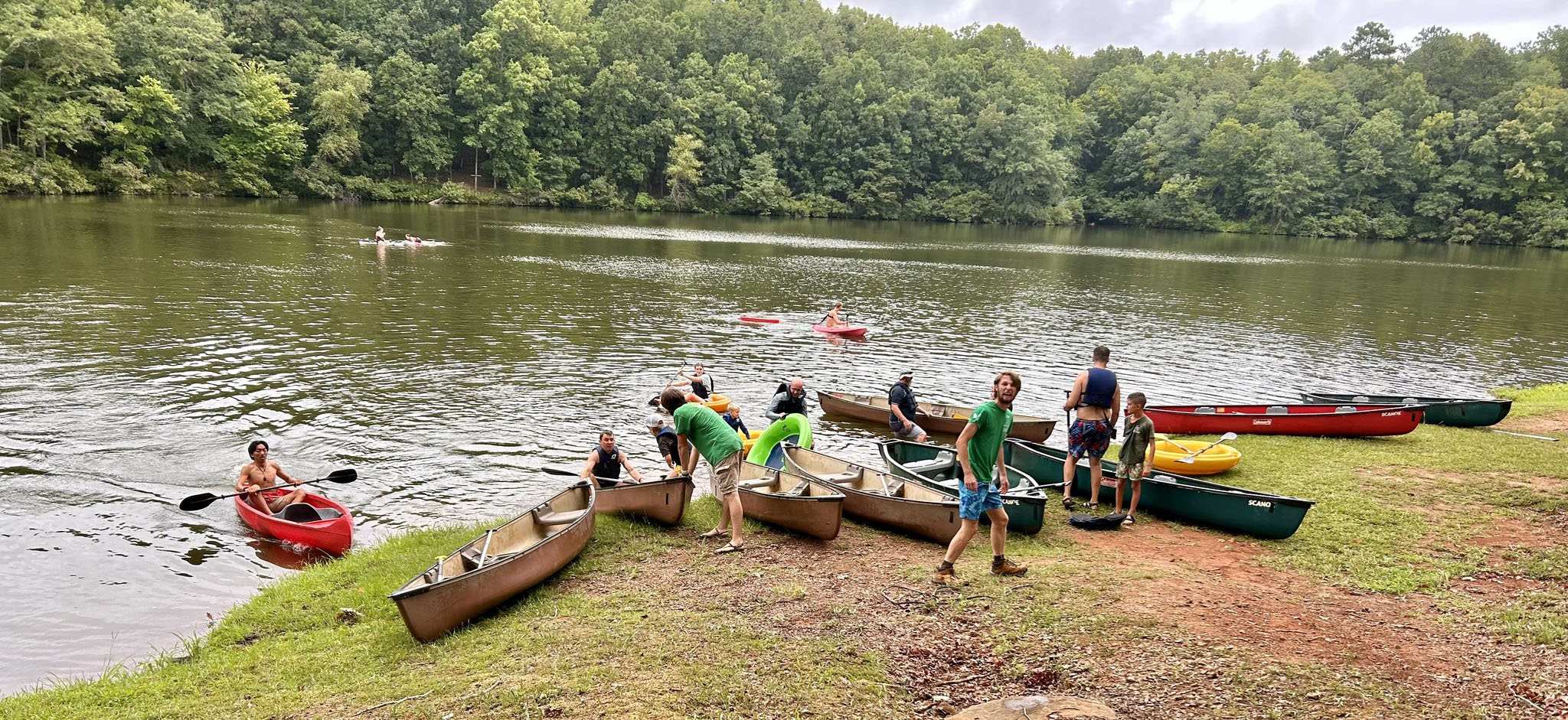
Camp Kaleo
Turnaround brings 77 more beds, doubling of revenue within five years
From 2002 to 2003, summer camp revenue more than doubled from $40,000 to $97,000. Within five years beds increased from 120 to 197, not including the 16 sleeping accommodations in the rustic Adirondack area of three-sided open camp shelters.
The new vision was being embraced and Kaleo was slowly digging itself out of the red, generating revenue for regular maintenance brought on by increased usage of the site. Staff salaries and benefits, like other departments at the state convention, were covered through the Cooperative Program budget but the camp itself was becoming less dependent on a subsidy.
Flowers realized parents who live nearby needed day care for their children so he offered day camps within a safe Christian environment. In so doing, he noticed that frequently the children would return as campers, generating future revenue while having an opportunity to hear the gospel.
Over the next decade-and-a-half, he enrolled more churches in family weeks and boosted Royal Ambassador experiences as a Christian alternative to Boy Scouts. By marketing its facilities to churches, congregations began hosting church camps and mid-week settings for staff development. Deacon groups and men’s and women’s fellowship groups began reserving cabins for weekend getaways. Family and church homecomings became popular options.
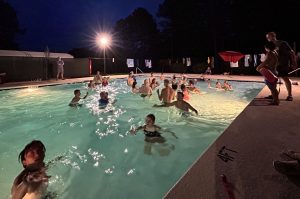
Camp Kaleo
The approach was especially attractive among ethnic groups. Single Hispanics regularly booked Labor Day Weekend, and Hispanic congregations virtually booked the remainder of September. Other ethnic groups joined in and embraced the slow months for similar outings, including reunions.
Due to the slowly increasing cash flow, Flowers and his wife worked with public schools to hosts students for outdoor day trips — offering the camp without cost to middle school students who excelled in their CRCT scores. Kaleo began its own outreach to the community, much like any church.
In the summer of 2017, Kaleo hosted 3,000 guests, up from 2,500 the previous year. By the time the summer had ended, 117 professions of faith were recorded — far more than many Georgia Baptist churches and more than hundreds of churches that report no annual professions.
The dining hall was having trouble keeping up with meal service and had to go to staggered serving times to accommodate the crowds. Tables were set up outside to feed the campers.
The following year, the new vision had proved itself sustainable and the camp was rebranded as a year-round retreat center.

Thomas Hammond
Flowers’ management style was paying high dividends, and eventually the reserves increased to nearly $200,000. Like all departments at the state convention, he received a monthly budget update detailing Kaleo’s balance and any funds deducted for maintenance. That is, until January 2019 when, under the new administration of Executive Director Thomas Hammond, the updates stopped coming.
Men’s Ministries shuttered in 2019, cash reserves removed from Kaleo control
That’s also the month when Glen McCall’s position as director of Men’s Ministries was eliminated. By virtue of not filling the position, the Georgia convention effectively shut down men’s outreach without notice. It, like the Kaleo budget, just disappeared.
The Index had long been a promoter of the camp, documenting its financial turnaround and cash-positive footing.
Two years later, in a February 8, 2021, story, former Index Editor J. Gerald Harris reported that, in the wake of closing the Toccoa conference center, “leadership has affirmed there is no intention of getting out of the camping/conference/retreat ministry but acknowledged that it is not financially prudent to use a facility with Toccoa’s unique challenges” — specifically delayed maintenance, an inability to support itself, and a lack of support from churches.
Those were the same charges the Administration Committee — with little questioning by the Executive Committee — would level against Kaleo in just three years.
In the article, Harris acknowledged that while Kaleo is far smaller than Toccoa, it “typically operated in the black. And who wouldn’t enjoy Camp Kaleo?,” he stated as an alternative to the larger retreat center.
More than outdoor activities; discipleship is core purpose
But Kaleo is far more than outdoor activities such as archery, hiking trails and swimming, which Harris correctly itemized in his story. Those are the items that first attract interest but the real purpose for the camp is much deeper.
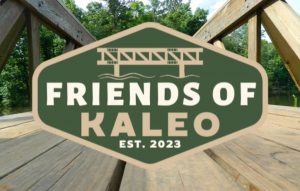 “Our ministry has always been to build discipleship networks with Georgia Baptist churches, but our mission is to Monroe, Bibb, Lamar, Butts and any other counties who call us for assistance with their students,” Flowers said.
“Our ministry has always been to build discipleship networks with Georgia Baptist churches, but our mission is to Monroe, Bibb, Lamar, Butts and any other counties who call us for assistance with their students,” Flowers said.
“Just as Baptist Campus Ministries is a great discipleship ministry and building future leaders in our churches, on the mission field, and to the denomination at large, we are the farm league with those younger students … both believers and non- … who come to us for a weeklong camp or a day camp.
“We never miss an opportunity to share Christ with those with an ear to hear. How many churches have the opportunity to build the inroads into their communities as Kaleo has,” he asked. “We are making Kaleo known to surrounding counties so we can make Jesus known to their children and parents.”
Flowers is perplexed at how the Index’s positive reporting on professions of faith at the camp could have been overlooked in the Administration Committee’s yearlong study. Somehow, he maintains, Kaleo was saddled with the antiquated memory of deficits and declining attendance it had long left behind. Most importantly, the last 20 years of its turnaround was completely ignored in the Administration Committee’s study.
Professions of faith frequently total more than those from churches
As recently as August, Index staffer Henry Durand quoted current director Luke Foster about the evangelistic results at the camp. Kaleo had hosted more than 500 day and overnight campers and reported 21 salvation decisions, not including other spiritual decisions.
“One of the coolest things,“ Foster said, “is that a couple of the kids wanted to be baptized right in the pool at the camp.” He says the camp pastor spoke to the children and their parents to make sure they knew what they were asking before baptizing them.
BNG conversations with Georgia pastors and laity underscore the underlying role of discipleship which Kaleo offers. “It’s found in the quiet times in a personal Bible study, in an interaction with a counselor, or in an evening time of commitment around a campfire,” Flowers said.
In a final interview with Harris in 2022, Flowers reminisced about his tenure at the camp.
“Our greatest joy was seeing how camp impacted the lives of so many for the cause of Christ. We probably had over 3,000 come to faith in Christ Jesus during those years,” he said.
Which, on a prorated scale over 19 years at an average of 157 professions per year, is far more than most Georgia Baptist congregations report.
In the three years since his monthly budget disappeared, after growing tired of asking the state convention for funds to cover maintenance, Flowers sensed his own moment of decision. Acknowledging that he felt he was being asked to make bricks without straw, he accepted a pastorate at Rosemont Baptist Church in Waynesboro, Ga.
Fast forward five years after the reserve funds disappeared and Kaleo is today painted as being a money pit whose time has come. Common justification is that a ministry is no longer affordable and the state can be a better steward reallocating Cooperative Program dollars elsewhere.
But for now, Flowers seeks to clear the camp’s reputation and those who helped bring the facility into the black, with reserves to spare.
“The sky is not falling as the letter from the Administration Committee alleges,” he said. And he is still trying to figure out how $5 million in delayed maintenance for a rustic camp slipped by him.

